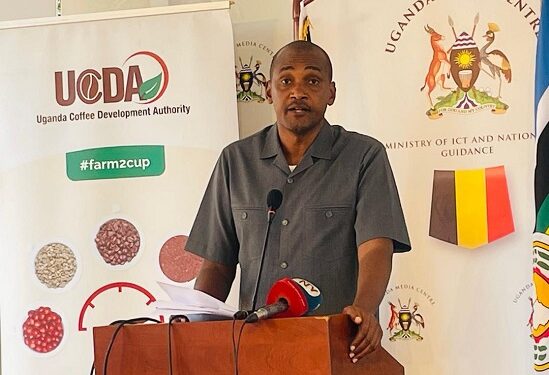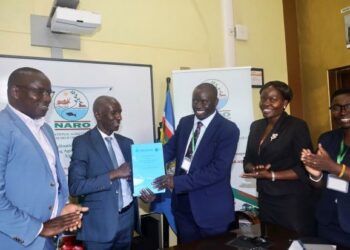The Minister of Agriculture, Animal Industry, and Fisheries, Frank Tumwebaze, has urged the public not to politicise the registration of coffee farmers but to see it as a critical step towards securing Uganda’s place in international markets.
Speaking at the launch of the registration exercise of all coffee farmers at Uganda Media Centre on Tuesday, the Miniter highlighted that this initiative will enhance traceability, ensure quality standards, and boost the competitiveness of Uganda’s coffee, ultimately benefiting all Ugandans.
The minister urged that different markets have different requirements for coffee imports. For example, imports into China require registration with the General Administration of Customs of the People’s Republic of China (GACC), Sudan being a main consumer in Africa requires ISO Certification and submission of annual test results for both physical and biochemical coffee parameters to Sudanese Standards and Metrology Organisation (SSMO) and the European Union requires compliance with the European Union Deforestation Regulation (EUDR).
He also revealed that registering coffee value chain actors is an essential precursor to creating a National Traceability System. “Such measures are vital for supporting our coffee farmers, enhancing sustainability, improving market access, and ensuring compliance with both local legislation and international regulations.”
It must be recalled that on 5th December 2022, the European Parliament approved the European Union Deforestation Regulation (EUDR) aimed at ensuring that supply chains remain free from products contributing to deforestation and forest degradation.
The regulation targets seven commodities and their derived products, namely cattle, cocoa, coffee, oil palm, soya, wood, and rubber whether imported or produced within the EU. These commodities will be prohibited from entering the EU market if they are produced on land cleared of forest for agricultural purposes after 30th December 2020.
The EU regulations came into effect on 29th June 2023 and will come into application on 30th December 2024. The regulation is part of the broader efforts intended to combat climate change, biodiversity loss, and environmental degradation.
The EUDR requires that all products exported or imported to the EU market are; deforestation-free; the production of coffee was done on land that was not subject to deforestation or forest degradation after 30th December 2020. Produced following the relevant legislation of Uganda. Accompanied by a due diligence statement; containing geolocation data adhering to traceability standards that enable buyers to trace each batch of coffee back to its designated land plot.
Uganda as one of the largest exporters of coffee in the international market has to abide by the regulations since the EU represents a primary export market for Ugandan coffee, with over 60 per cent exported to the EU market including Italy, Germany, Spain, Belgium, Portugal, Russia, Switzerland, Sweden and the Netherlands.
Therefore for each of these export market segments mentioned in the EUDR, Uganda’s approach has been to ensure adherence to the set standards. It’s for this reason that the Ministry and Uganda Coffee Development Authority plus other private partners continue to mobilise and offer advice to the various actors in the value chain (farmers, traders, exporters, etc.) to act right and comply so that Uganda does not lose the European market.
Why the EU Market is such an important market
Coffee is an important crop nationally and globally. Coffee’s global annual value is $465 billion and ranks as the world’s second-largest revenue earner after oil. Uganda is the 7th largest coffee producer in the world and the second-largest producer in Africa. Coffee is one of Uganda’s main foreign exchange earners contributing 11-22% of commodity exports in the last 11 years i.e. averaging 14% over the period.
In Uganda, Coffee is grown on an estimated 353,907 hectares of land by about 1.8 million smallholder farmers and 90 per cent of these smallholder farmers own gardens ranging between 0.5 and 2.5 hectares in size. More than 9 million people in Uganda are estimated to derive their livelihood from coffee-related activities along the value chain.
In FY 2023/24, the 10 major destinations of Uganda coffee took 5,390,551 bags accounting for 87.94% of total exports. Coffee exports to Africa amounted to 987,138 bags in FY 2023/24 accounting for 16% of total exports.
African countries that imported Uganda coffee included Sudan, Morocco, Egypt, Libya, Algeria, Kenya and South Africa. Europe remained the main destination for Uganda’s coffees in June 2023 with a 69% import share. In FY 2023/24, Europe imported 4,023,480 bags of coffee representing 66%.
According to the minister as a way of easing the process of registering all coffee farmers, a dedicated Technical Working Group has been established to oversee the effective implementation of EUDR regulations. This group comprises representatives from UCDA, MDAs and the private sector.
Also, a Geospatial Monitoring and Evaluation (M&E) System and Farmer Registration Application has been developed to capture geolocation data for all production plots where coffee or related products are cultivated.
“In addition to the efforts towards retaining the existing markets, the Government of Uganda will continue efforts to promote agricultural products such as coffee to emerging markets including China, Middle East, Maghreb among others,” he said.
He added “All coffee value chain actors including farmers, traders, processors etc. will be registered. The enumerators will record essential details of the value chain actors such as their name, farm name and location, and type of coffee grown/produced, among others.” Adding: “In addition, enumerators will map farms/gardens by recording their GPS coordinates. UCDA will store and manage the data collected in partnership with NITA(U) and will ensure compliance with the Data Protection Act during the collection, storage and management.”
Do you have a story in your community or an opinion to share with us: Email us at editorial@watchdoguganda.com













